American Goldfinch
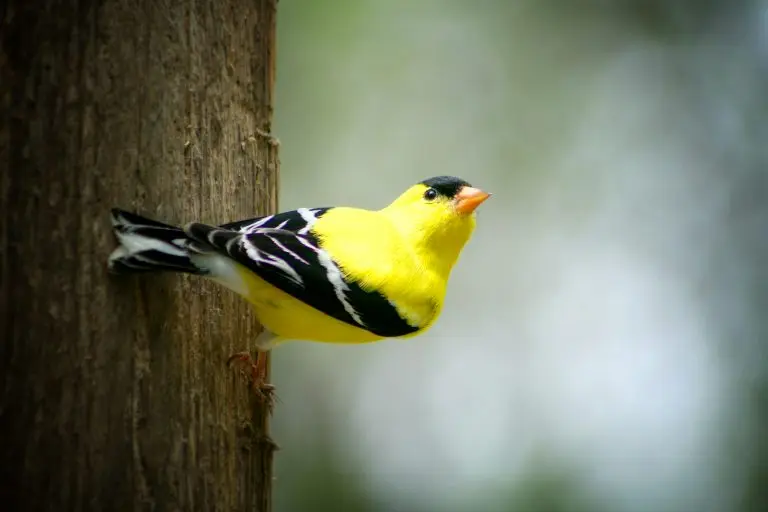
yellow and blackbird
American Goldfinches Are Popular Birds With Males With Bright Black And Yellow Colors In Spring. Females Are Dark Brown, As Are Males In Winter.
- Länge: 4.3-5.1 in (11-13 cm)
- Weight: 0.4-0.7 oz (11-20 g)
- Wingspan: 7.5-8.7 in (19-22 cm)
American Goldfinches Can Be Found Throughout North America. The Breeders Are Located In Canada And The Mid-west In Canada Before Moving To The Southern States. They Remain For The Entire Year In The Remaining Part Of The U.s.
They Are Found In Weedy Fields And Overgrown Areas, Looking In Search Of Sunflower, Thistle, And Other Aster Species. They Are Also Common In Parks, Suburban Areas, And Backyards.
Plant Milkweed And Thistles To Draw Even More American Goldfinches To Your Backyard. They Are Frequent Visitors To Bird Feeders, And They Will Prefer Sunflower Seeds And Nyjer Seeds.
Common Yellowthroat
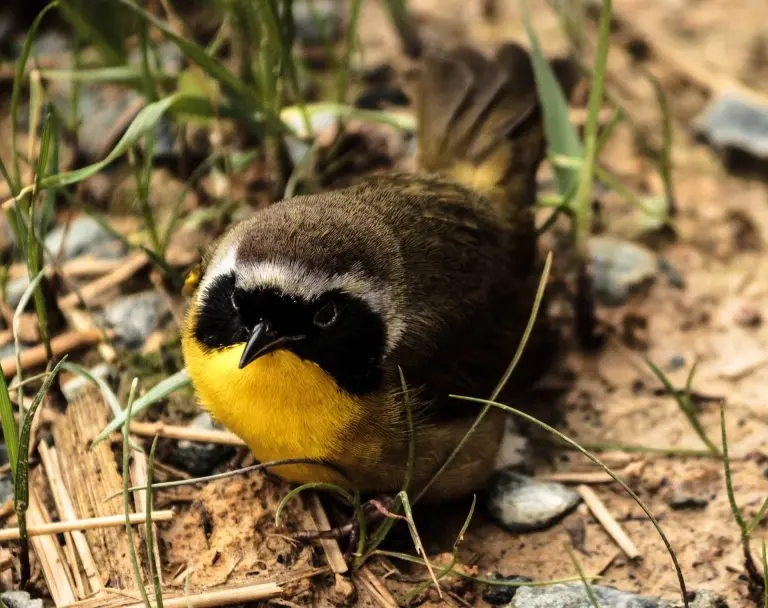
black and yellow small bird
Common Yellowthroats Are Tiny Songbirds With Brownish On Their Backs And Bright Yellow Beneath And Have Long Tails. Males Wear Black Masks Across Their Faces. The Yellow’s Brightness May Vary Depending On The Location And Could Be More Olive Under The Skin In Certain Areas.
- Länge: 4.3-5.1 in (11-13 cm)
- Weight: 0.3-0.3 oz (9-10 g)
- Wingspan: 5.9-7.5 in (15-19 cm)
Common Yellowthroats Have A Summer Breeding Season Across Most Of North America, Except Alaska And Northern Canada. A Few Remain Throughout The Season-long Along Their Gulf Coast And Pacific Southwest.
They Are Often Seen In The Spring And Summer, Often In Wetland Or Marshy Areas, As Well As In Fields Of Brush In Dense, Tangled Vegetation
They Mainly Eat Insects And Are Located In Large Backyards With Many Plants.
Western Meadowlark
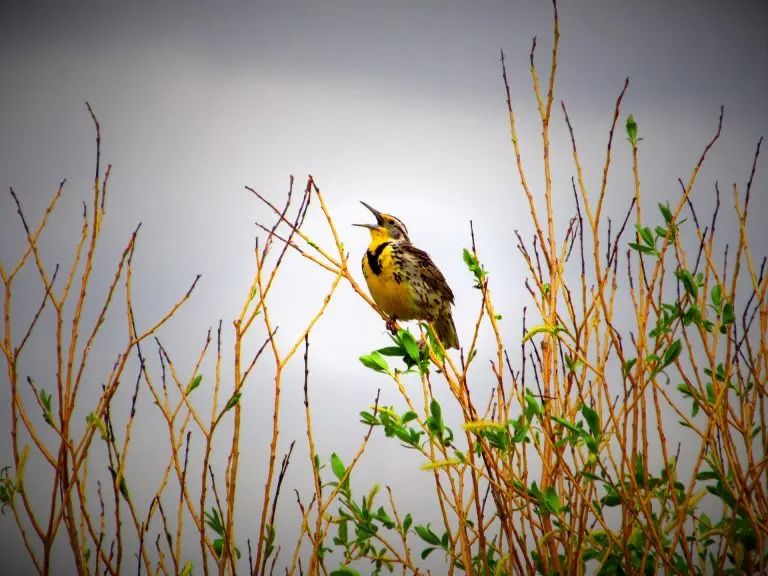
black bird with red and yellow wings
Western Meadowlarks Will Brighten Your Day With Their Bright Yellow Bellies And Melodious Songs. This Is Likely Why These Birds Are So Beloved, So Much So That They Are The Official Bird Of Six States.
Western Meadowlarks Are Related To Blackbirds. They’re About The Size Of A Robin With Brown Tones And White Upperparts And A Black V-shaped Band That Runs Across The Chest Of Bright Yellow That Changes To Grey In The Winter.
- Long: 6.3-10.2 in (16-26 cm)
- Weight: 3.1-4.1 oz (89-115 g)
- Wingspan: 16.1 in (41 cm)
Breeding Occurs In The Northwestern U.s. Along With Canada Before Shifting To Southern States. People In The West And Midwest Stay All Through The.
Western Meadowlarks Can Be Found Searching For Insects And, Seeds In Seeds And Weeds In The Open Or In Small Numbers In Meadows, Grasslands, And Fields.
Lesser Goldfinch

black birds with yellow and red wings
Lesser Goldfinches Are Tiny, Bright Black And Yellow Songbirds With Broad, Pointed Wings And Long Butcher Tails. Females Have Olive Backs And A Duller Yellow Underside.
- Länge: 3.5-4.3 in (9-11 cm)
- Weight: 0.3-0.4 oz (8-11.5 g)
- Wingspan: 5.9-7.9 in (15-20 cm)
Lesser Goldfinches Are Found Throughout Lesser Goldfinches Are Found In The Southwest And West Coast Throughout The Year Some Species Relocate From Higher Elevations In Winter.
Lesser Goldfinches Can Be Found In Large Groups In Open Habitats, Including Thickets, Fields With Weeds, Forest Clearings, Parks, And Gardens. They Hunt For Seeds, Particularly Sunflower Seeds, But Also Fruits From Coffeeberry, Elderberry, And Cottonwood Buds And Willows. They Also Eat Sycamores, Scam, And Alders.
You Can Draw Additional Lesser Goldfinches To Your Yard By Planting Sunflower Seeds And Nyjer In Tube Or Platform Feeders.
Prairie Warbler

black bird with red and yellow wing
hese Tiny Songbirds Have Olive Green On Their Back And Yellow On Their Stomachs And Throats. They Are Black With Streaks Of Black Along The Sides And An Elongated Dark Area Under The Eye. Female Prairie Warblers Tend To Be Duller In Their Color.
- Long: 4.3 in (11 cm)
- Weight: 0.2-0.3 oz (6.4-8.8 g)
They Breed In The Southeastern And Eastern States And Are Found Within Florida, The Caribbean, And Some Coastal Areas Within Central America.
The Ones In Florida Which Remain Throughout The Year-long Are Considered Distinct Subspecies, And Slightly Larger.
While They Are Referred To As Prairie Warblers, They Reside In Forests And Fields.
Orchard Oriole Female
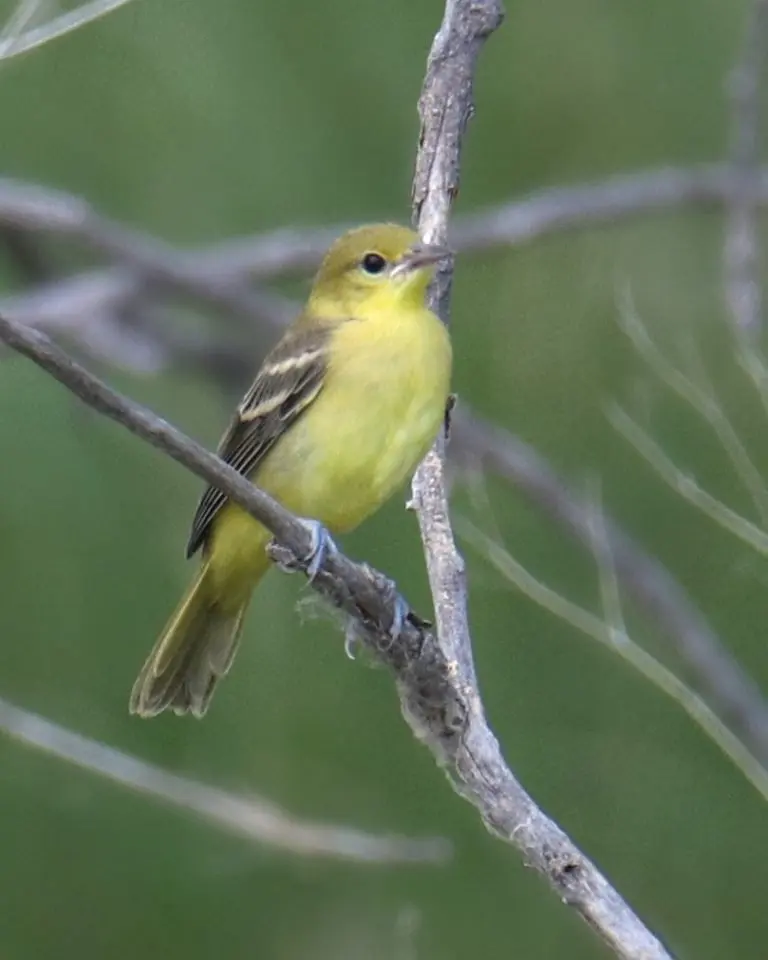
birds yellow and black
Orchard Orioles Females Are Generally Greenish-yellow, With A Lighter Underside, Darker Back Whites, And Darker Wings—bar On The Wing. Males Appear Very Different, With Blackheads, Backs, And Reddish Undersides.
- Long: 5.9-7.1 in (15-18 cm)
- Weight: 0.6-1.0 oz (16-28 g)
- Wingspan: 9.8 in (25 cm)
Orchard Orioles Breed In The Eastern And Central States During The Summer Months Before Moving Into The Southern Part Of Mexico In The South And Central America.
They Prefer Open Woodlands. Orchard Orioles Are Found On River Banks, Open Farmland, And Backyards. They Construct Nests That Resemble Hanging Pouches.
Their Diet Is Mostly Insects Such As Caterpillars, Ants, Grasshoppers, Beetles, And Caterpillars, As Well As Spiders. They Consume Nectar From Flowers And Consume Fruits Like Mulberries And Chokeberries.
To Draw Orchard Orioles To Your Yard, Consider Hummingbird Feeders Or Platform Feeders Made Of Cut Mangos Or Oranges. Additionally, You Can Plant Native Berry Plants Like Chokeberries Or Mulberries.
Western Tanager
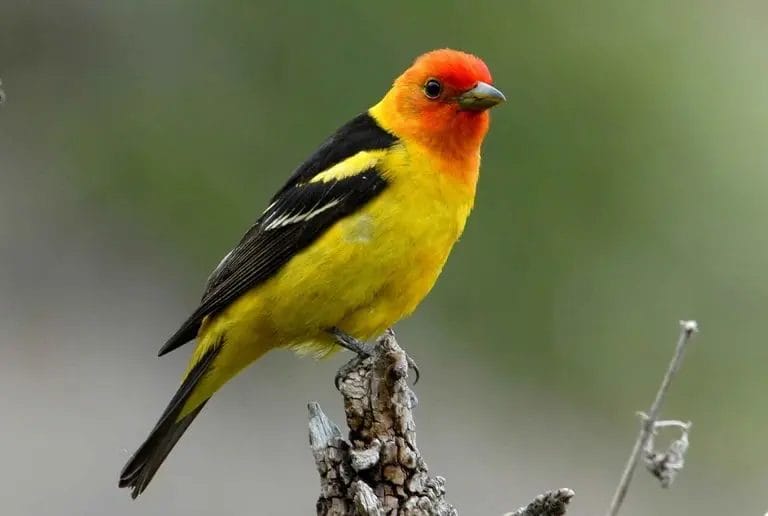
small black and yellow bird
Western Tanagers Sport A Fiery Orange-red Head And Body With Black And Yellow Wings.
- Länge: 6.3-7.5 in (16-19 cm)
- Weight: 0.8-1.3 oz (24-36 g)
The Breeders Are Located In The Western Us States As Well As Canada. They Can Be Observed When They Migrate Between The South And East Of The Range. The Winter Months Are Spent In Mexico In Both Central America.
They Are Found In Open Coniferous Forests But Remain In The Canopy Despite Their Vibrant Color. The Red Hue Is Probably From Eating Insects, Which Produce The Pigment Western Tanagers Can’t Make.
You Can Lure Western Tanagers By Feeding Them Dried Fruits, Including Cut Oranges And Other Fruit From Bird Feeders.
Pine Warbler
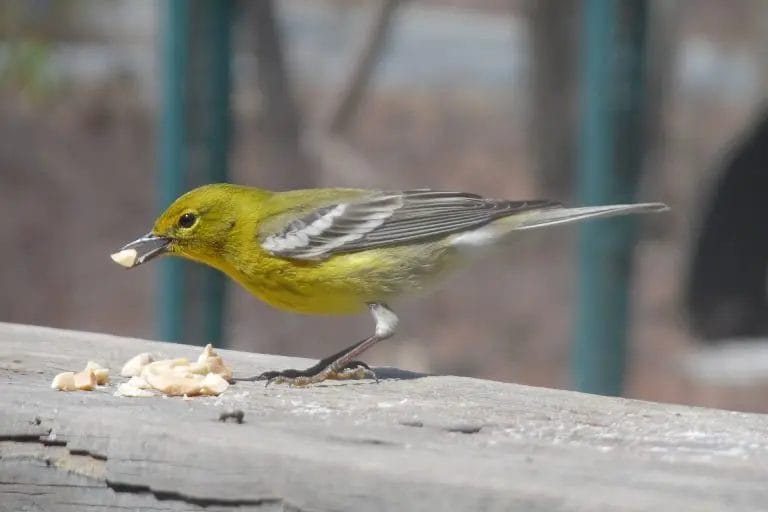
yellow and blackbirds in California
Pine Warblers Are Small, Plump Yellow Birds With Their Mates’ Olive-colored Backs, White Bellies On The Lower Part Of Their Bodies, And Gray Wing Bars. Females May Appear Darker And Have More White Belly Area.
- Länge: 5.1-5.5 in (13-14 cm)
- Weight: 0.3-0.5 oz (9-15 g)
- Wingspan: 7.5-9.1 in (19-23 cm)
They Reproduce Within Northeastern Us States Before Heading South. They Are Also Present Throughout The Year Throughout The Southeastern Us States.
Pine Warblers, As Their Names Suggest, Can Be Seen In Pine Forests And Are Often Found High Within The Tree. They Feed On Caterpillars, Beetles, Spiders, And Other Larvae And Insects, And When The Weather Gets Cooler, They Will Consume Fruit And Seeds.
You Can Also Attract More Pine Warblers Using Tube And Platform Feeders Made Of Millet, Smashed Corn, Sunflower Seeds, Peanut Hearts, And Suet. You Can Also Plant Native Fruits And Vines Like The Grape, Bayberry, And Sumac, Along With Virginia Creeper.
Yellow Warbler

black and brown bird with yellow beak
Yellow Warblers Are Tiny, Bright Yellow Birds With An Orange-green Back. Males Have Chestnut-colored Streaks On Their Breasts. They Are Common During Summer. They Are Grayish-black With Streaks On Their Wings.
- Long: 4.7-5.1 in (12-13 cm)
- Weight: 0.3-0.4 oz (9-11 g)
- Wingspans: 6.3-7.9 in (16-20 cm)
Yellow Warblers Travel A Considerable Distance To Breed Throughout Large Areas Of North America Before Heading Into Central And Northern South America For Winter.
They Are Visible During Migrations In The Far South.
Yellow Warblers Can Be Seen In Wetlands And Streams Thickets And On The Edges Of Fields Where They Eat Insects, Such As Caterpillars, Bugs, Beetles, Midges, And Wasps.
Warblers Are Challenging To Draw To Your Garden As They Are Shy And Consume Mostly Insects. However, You Could Try Suet, Citrus As Well As Peanut Butter.
Yellow-headed Blackbird
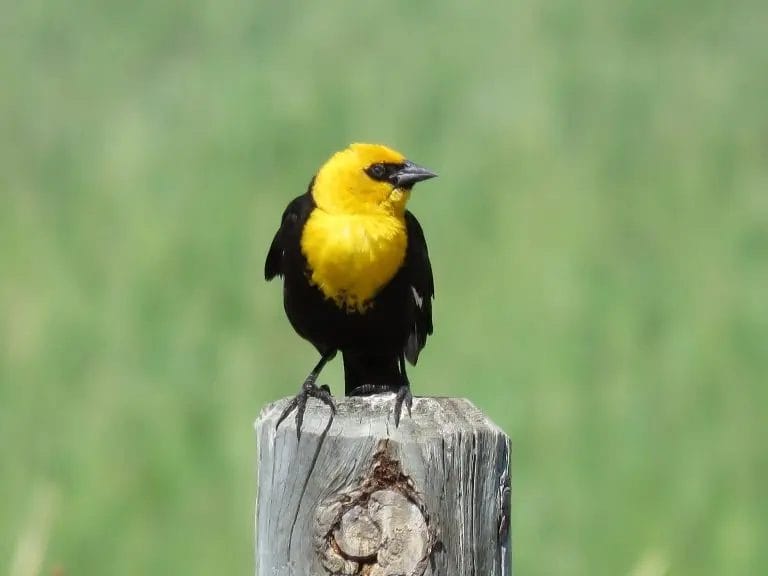
black and white bird with a yellow chest
Yellow-headed Blackbirds Are Striking Birds With Shiny Black Bodies, Bright Yellow Chests And Heads, And Black Patches Of White On Their Wings Of Males. Females Are Brown, Not Black, And The Head Yellow Is Duller. They Are Bigger Than Red-winged Blackbirds.
- Long: 8.3-10.2 in (21-26 cm)
- Weight: 1.6-3.5 oz (44-100 g)
- Wingspan: 16.5-17.3 in (42-44 cm)
Breeding In The Western And Prairie Wetlands, Nesting In Reeds, And Foraging In The Grasslands, Wetlands, And Fields For Mainly Insects During The Summer.
They Move To Farms And Fields Across Arizona, New Mexico, Texas, And Mexico In Winter To Feed Primarily By Eating Seeds. They Do This In Massive Numbers.
By Planting Sunflower Seeds, You Can Draw More Blackbirds With Yellow Heads In Your Backyard.
White-eyed Vireo

small black white and yellow bird
A Tiny Songbird That Is The Shades Of Yellow And Gray. White-eyed Vireos Are Gray With Gray Heads And A White Throat, Chest, And Yellow Sides. They Also Have Dark Wings And Two White Bars With Black Streaks.
They Are Yellow On The Forehead And Around The Eyes. They Also Have An Eye With White Color.
- Lange: 4.3-5.1 in (11-13 cm)
- Weight: 0.3-0.5 oz. (10-14 g)
- Wingspans: 6.7 in (17 cm)
In The Summer, They Travel Out Of Sight Across The Southeast United States, Hidden Among The Thickets. They Spend Winter On The Coast Of The Southeastern Part Of Mexico And The Caribbean.
White-eyed Vireos Are Attracted By Insects, Flies, And Spiders In Brambles And Pastures Overgrown.
Eastern Meadowlark

black bird with red and yellow tipped wings
Medium-sized Songbirds Are Bright Yellow Beneath And Lighter Brown, With Dark Marks Along Their Back. They Feature A Distinct Black Band Across Their Chest.
- Long: 7.5-10.2 in (19-26 cm)
- Weight: 3.2-5.3 oz. (90-150 g)
- Wingspan: 13.8-15.8 in (35-40 cm)
It Is Found All Through The Eastern Us States. However, They Also Breed Throughout The Northeast And Canada Before Migrating South.
They Are Often Found In Prairies And Grasslands, Feeding On Insects. In Winter, They Gather In Large Numbers In Fields To Search For Seeds.
Yellow-throated Warbler
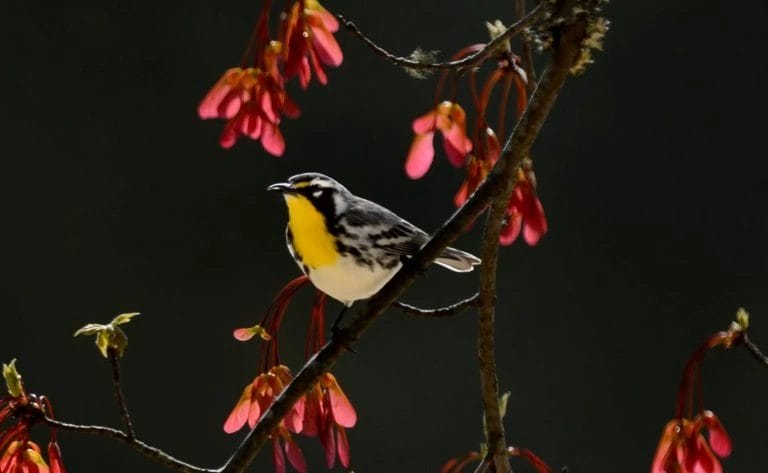
small black and white striped bird with yellow throat
Like The Common Yellowthroat, The Yellow-throated Warbler Has A Gray-white Body With Black Stripes Instead Of A Brown-colored Body.
- Länge: 5.1-5.5 in (13-14 cm)
- Weight: 0.3-0.4 oz (9-11 g)
- Wingspan: 8.3 in (21 cm)
Yellow-throated Warblers Breed In The Southeastern Us States. They Are Winter Residents In Florida, The Caribbean, And Along The Gulf Coast Into Central America. Some Birds Might Remain Throughout The Year-round In Florida.
They Live On The Tops Of The Pine Trees But May Hunt Lower During Migration.
Evening Grosbeak

american goldfinch yellow and black bird
In The Evening Grosbeak Males Are Black And Yellow, With White Patches On The Wings. Males And Females That Are Immature Tend To Be Gray.
- Länge: 6.3-7.1 in (16-18 cm)
- Weight: 1.9-2.6 oz (53-74 g)
- Wingspan: 11.8-14.2 in (30-36 cm)
They Are Found All Year Round In The Southern Part Of Canada And The Rocky Mountains In Coniferous Forests. They Could Relocate To Southern Us States If The Pine Cone Crop Is Scarce.
Evening Grosbeaks Could Be Seen In The Winter Months At Sunflower Seed Feeders If The Pine Cone Crop Isn’t Doing Well.
Scott’s Oriole

Black And Yellow Birds
A Distinctive Large Oriole With A Bright Yellow Underside And A Black Back And Head For Males. Females Are Lighter Brown With Olive Backs.
- Long: 9.1 in (23 cm)
- Weight: 1.1-1.4 oz (32-41 g)
- Wingspan: 12.6 in (32 cm)
Scott’s Orioles Breed In The Southwest Us States And Are Often Found In Dry Areas, Eating With Insects Found Inside Yucca
Hooded Oriole
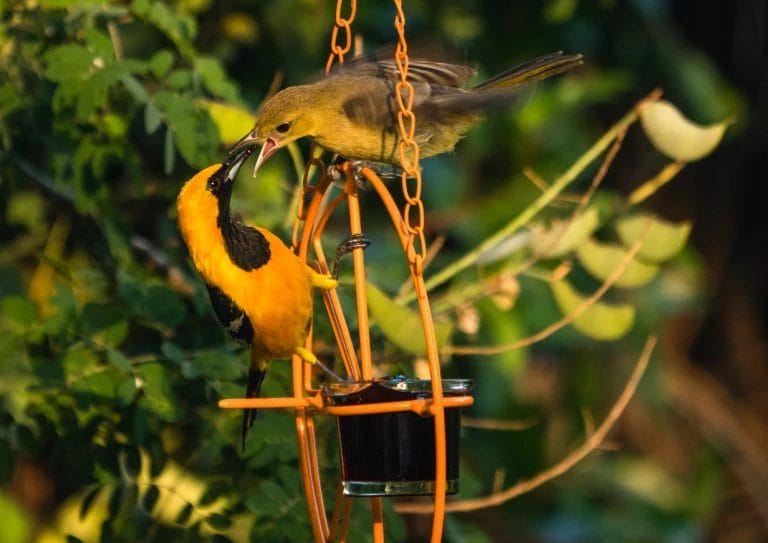
Black And Yellow Birds
.male Hooded Orioles Can Range Between Bright Yellow And Orange With Black Backs And Throats. Immatures And Females Tend To Be More Yellow, With Grayish Wings. Females Aren’t Sporting The Black Markings On Their Faces.
- Länge: 7.1-7.9 in (18-20 cm)
- Weight: 0.8 oz (24 g)
- Wingspan: 9.1-11.0 in (23-28 cm)
They Reproduce In The Southwest Us States, Creating Hanging Nests From The Palm Fronds’ Bottoms.
They’ll Come To Nectar Feeders Or Use Fruits To Attract Birds.
Wilson’s Warbler
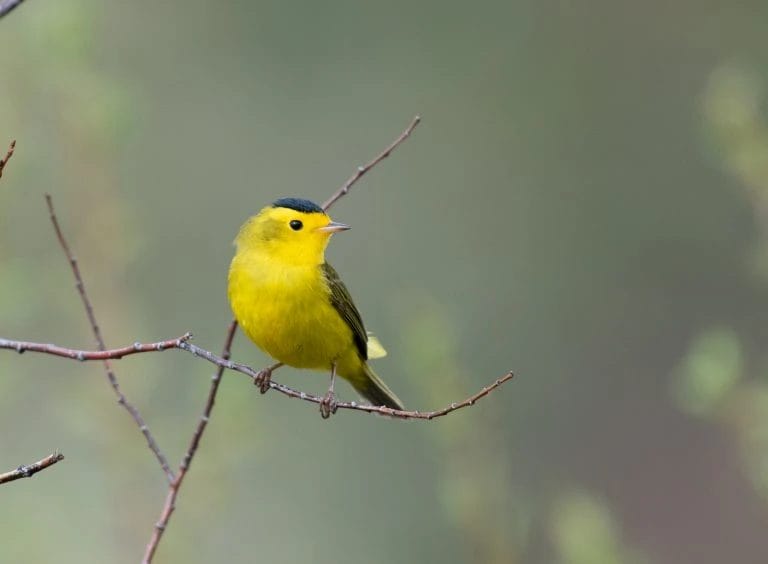
Black And Yellow Birds
Wilson’s Warblers Are Tiny Yellow Warblers With Caps Of Black In Males And An Olive Cap For Females.
- Long: 3.9-4.7 in (10-12 cm)
- Weight: 0.2-0.3 oz (5-10 g)
- Wingspan: 5.5-6.7 in (14-17 cm)
Breeding Is Occurring In Canada, Alaska, And Northwestern States, Wilson’s Warblers Can Also Be Observed In All States During The Migration. They Spend Winter In Mexico In Addition To Central America.
To Locate Wilson’s Warblers, Walk At The Streams That Run Through Thickets.
- Read More Article: Texas Birds
- Read More Article: How Long Do Birds Live
- Read More Article: Tropical Birds- Top 8 Tropical Birds
- Read More Article: Bird Flying
- Read More Article: How Do Birds Mate-Everything Explained
- Read More Article: Top 28 Dog with Strongest Bite Ever (with Pictures )








